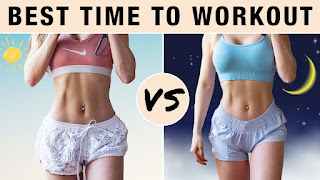Best Timing for Exercise
When it comes to exercise, there are a lot of factors to consider, including what type of exercise to do, how frequently to do it, and for how long. But one factor that often gets overlooked is timing. When is the best time to exercise? Does it matter if you work out in the morning or the evening? In this article, we'll explore the science behind the best timing for exercise and offer some tips to help you maximize your workouts.The Science of Circadian Rhythms
The first thing to consider when thinking about the best timing for exercise is the body's circadian rhythms. These are the internal "clocks" that regulate our sleep-wake cycles, metabolism, and other physiological processes. Studies have shown that our circadian rhythms can have a significant impact on our physical performance and recovery.
Morning vs. Evening Exercise
So, is it better to exercise in the morning or the evening? The answer may depend on your individual circadian rhythms and other factors like your work schedule and personal preferences. However, there are some general pros and cons to consider for each option.
Pros of Morning Exercise
- Boosts energy and metabolism for the dayCan improve sleep quality at night
- May be easier to establish a consistent routine
Cons of Morning Exercise
- May feel more challenging for some people, especially if not a morning person
- May require waking up earlier, which can be difficult for some
- May not be the best option for certain types of workouts, such as high-intensity training
Pros of Evening Exercise
- Can help release stress and tension from the day May be more enjoyable for some people
- May be better for certain types of workouts, such as high-intensity training
Cons of Evening Exercise
- May interfere with sleep quality if done too close to bedtime
- May require more discipline to stick to a consistent routine
- May not be ideal for people with busy evening schedules or commitments
Other Factors to Consider
- In addition to circadian rhythms and personal preferences, there are other factors to consider when determining the best timing for exercise. These include:
- Meal timing: Eating a large meal right before exercise can cause discomfort and affect performance. It's best to wait at least 30 minutes after eating before working out.
- Temperature: Outdoor workouts may be more comfortable in the morning or evening when temperatures are cooler.
- Work schedule: If you work early in the morning or late at night, it may be more practical to work out at a different time of day.
- Fitness goals: Depending on your fitness goals, certain types of workouts may be more effective at certain times of day. For example, if you're trying to build muscle, you may want to do strength training in the evening when testosterone levels are highest.
Tips for Maximizing Your Workouts
No matter what time of day you choose to exercise, there are some tips you can follow to help maximize your workouts and get the most out of your efforts.Stay Hydrated
Proper hydration is essential for peak physical performance. Make sure to drink plenty of water before, during, and after exercise to prevent dehydration and promote optimal muscle function.
Fuel Your Body
Eating a balanced diet with plenty of protein, carbohydrates, and healthy fats is important for supporting physical activity. Make sure to eat a nutritious meal or snack before exercise to provide your body with the fuel it needs to perform.
Warm Up and Cool Down
To prevent injury and improve performance, it's important to properly warm up before exercise and cool down afterward. This can include stretching, foam rolling, or other mobility exercises.
Listen to Your Body
Everyone's body is different, so it's important to pay attention to how you feel during and after exercise. If something doesn't feel right, don't push through it. Take a break, modify the exercise, or seek medical advice if necessary.
Get Enough Rest
Rest and recovery are just as important as exercise itself. Make sure to get enough sleep and take rest days as needed to allow your body to recover and repair.Be Consistent
Consistency is key when it comes to achieving fitness goals. Find a schedule and routine that works for you and stick to it as much as possible.
Conclusion
In summary, the best timing for exercise may depend on individual factors like circadian rhythms, personal preferences, and fitness goals. However, there are some general pros and cons to consider for morning vs. evening exercise. No matter when you choose to exercise, make sure to stay hydrated, fuel your body, warm up and cool down, listen to your body, get enough rest, and be consistent in your efforts. With these tips, you can maximize your workouts and achieve your fitness goals.










0 टिप्पणियाँ